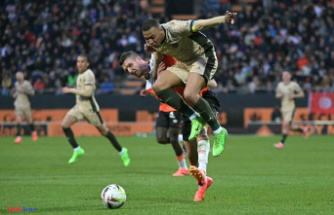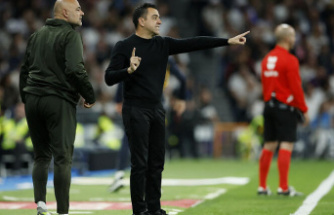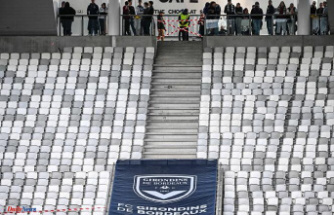First Japan, then Spain: How did the complete failure in the penalty shoot-out come about? The superstars Messi and Lewandowski previously forgiven miserably. Whether it's desert sand in your eyes or screams of workers' suffering in your ears - something's going wrong. A book and a look at the DFB would help.
Is this Austrian story known in Qatar? Do the kickers know the author with a passion for football in Spain, Poland, Japan or Argentina? Peter Handke's novel "The Goalkeeper's Fear of Penalties" from 1970 tells of the questions that have been on the minds of fans ever since penalties were introduced: who has the better cards when a shot is taken from the point, the keeper or the shooter? Who's more scared? Who feels more pressure?
Although the story is only subtly about football - it mainly follows the story of the former goalkeeper Josef Bloch, who becomes a murderer - the question now fits again at the World Cup in Qatar. Because everyone who knows the sport knows that the goalkeeper has far fewer chances than the shooter. But this tournament in the desert is not crazy for nothing: And so it seems as if this ancient law is simply being reversed here.
As a punishment for a foul or handball in the penalty area, the penalty kick has been around since 1891. Variants of modern penalty kicks were already up to mischief from the 1950s and 1960s, and were finally introduced worldwide in 1976. So of course also at the World Cup in Qatar. A single shot from a measly eleven meters decides between victory and defeat, glory or shame. It's the ultimate showdown.
Penalties celebrated their first international highlight at the 1976 European Championships. In the final between Germany and Czechoslovakia, Uli Hoeneß hit the ball into the evening sky, while Antonín Panenka made his mark in the history books: he converted his penalty with a light lob in the middle of the goal and crowned Czechoslovakia European champions.
Achraf Hakimi also did it with the cheeky chip on Tuesday evening with his homage to Panenka and lobbed his Moroccans into the World Cup quarter-finals for the first time. As the fourth shooter, he only had the opportunity to do so because all three (!) Spaniards had previously awarded the point. The goalkeeper's fear becomes the penalty shooter's fear in Qatar.
Sure, the fall height is far greater for those standing at the point than for those between the posts. The fans expect the goal from the shooter, the goalkeeper can become a hero like Keeper Bono for Morocco. It is said that the ball only needs 400 milliseconds to cover the eleven meters at around 100 kilometers per hour. Given that, the incredible lull in shots from the point in this tournament is as surprising as it is bewildering.
World footballer Robert Lewandowski started with a missed shot against Mexico. In the round of 16, he miserably missed a second time against France and was lucky that the penalty was retaken and he was still able to score his second World Cup goal. Then it was megastar Lionel Messi's turn. In the decisive last group game against Lewandowski's Poland, he missed the lead from the point. Only then followed the almost unbelievable blunders in a row by Japan (converted one of four penalties) and Spain (zero of three) in the penalty shoot-out.
Why are these kickers all looking so unlucky? Is it the desert sand in your eyes that covers Doha on some days and that surrounds the stadiums in the barren landscapes on the outskirts of the metropolis. In itself a suitable scenario for a duel of this kind. The opponents face each other like cowboys. Somewhere a ball of bushes flies by, Clint Eastwood, Charles Bronson and Henry Fonda may also be watching and a few notes of a melody by Ennio Morricone ring out. Only for the men on point, these scenes from western movies seem to be a bit too much these days.
Is it the air-conditioned stadium that takes the artificial to a new level at this World Cup? Or is it the pressure that a World Cup game, especially a duel in the knockout stages, brings with it and that causes concentration to plummet after 120 minutes of football? Fear eats penalty shooter soul.
In fact, the goalkeepers have probably intensified their penalty practice in recent years and studied video material and statistics. The fans in Qatar thank them. Morocco's keeper Bono received frenetic applause for every shot saved by the Spaniards, and hours later fans were dancing because of him on the streets of Qatar, Spain, the Benelux countries and of course his home country.
But the nature of the missed shots also looked questionable. Out of place, lax, too hasty. Have the super kickers lost their craft because the desert sand also ended up in the gearbox? How to do it, Germany demonstrated against Argentina in the 2006 World Cup quarter-finals. Podolski. Neuville. ballack Borowski. All shots landed hard just off the post in the inside netting. Untenable. It's just stupid that the DFB-Elf doesn't even get that far anymore that there could even be a duel from the point
"When the shooter starts running, the goalkeeper, just before the ball is shot, involuntarily indicates with his body the direction in which he is going to throw himself, and the shooter can shoot in the other direction," says Roman keeper Bloch in "The Goalie's Fear of the Penalty Kick". "The goalie might as well try to open a door with a straw."
If Lewandowski and Messi had, the Spaniards - who had even practiced "1000 penalties", as coach Luis Enrique emphasized in advance - and the Japanese would have read the book. This tip may work better than any mind game or attempt to stop. Perhaps you, dear Englishman, will read before the quarter-final smash against France. Qatar's national library is said to be well stocked.












